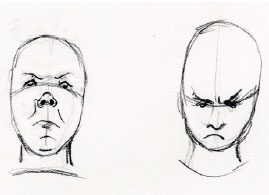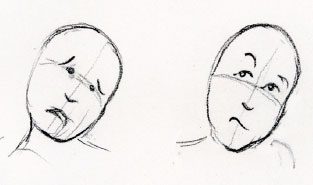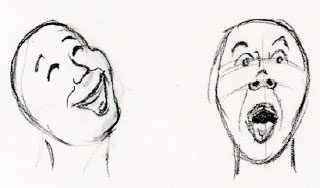In addition to what the face itself tells about the mood of the character, body and head position play a crucial role as well.
We almost never hold ourselves completely still unless we’re concentrating on being quiet.
Even when we stand straight, the head tilts to the side, hands emphasize points by gesturing, limbs shift, and even the trunk may sway back and forth.
But even a study of the face alone will reveal what a tremendous role the position of the head plays in conveying emotion.
Shifting the head will not only make the character’s expression more apparent at a glance, it will also add an additional touch of authenticity to the pose.
In expressions of derision, anger, and thoughtfulness, a head shift backwards or forwards will bring the emotion to a higher pitch.
In expressions that show empathy, concern, or in thinking poses, a head tilt to the side adds a very necessary ingredient to the authenticity of the face.
Experiment drawing the exact same face on a head that is held straight, and see for yourself how much is lost.
Real laughter and real surprise both entail movement in the head as well, and the expressions will appear posed or insincere without a tilt to the head.
The best way to teach yourself how and when to tilt the head for each expression is to watch people and, if possible, make sketches.
One good way of doing that is to watch a well-acted movie and keep a journal handy.
Not only are actors on a screen more accessible and easier to stop and rewind than real people, they’re also more inclined to make their body language and expressions easy to read.
Facial Expression Mastery is generously illustrated showing you step-by-step how to make your drawings facial expressions look life like.
With clear (and fun) instructions on how to draw …
… you’ll learn at your own pace in the comfort of your home.
You get 10 high definition videos with simple and easy to follow written instructions.
By the end of it — you’ll know exactly how to make your drawings jump off the page.





